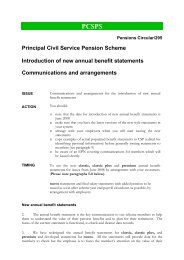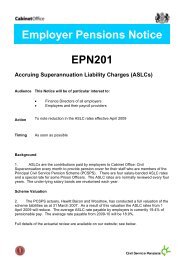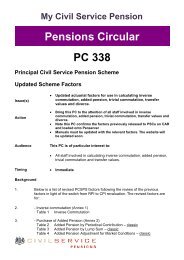Capability Reviews: Progress and Next Steps - The Civil Service
Capability Reviews: Progress and Next Steps - The Civil Service
Capability Reviews: Progress and Next Steps - The Civil Service
- No tags were found...
Create successful ePaper yourself
Turn your PDF publications into a flip-book with our unique Google optimized e-Paper software.
In their recent 12-month stocktake of the department’s progress since the originalreport, the review team commented that “there had been a significant <strong>and</strong> positivetransformation at director level. Below that level, an increasingly strengthenedleadership community was being created, with each SCS member accepting atleast one corporate responsibility which went beyond their day-to-dayresponsibilities.” <strong>The</strong>y highlighted, by way of example, “the improvements that hadbeen made in delivering strong board cohesion <strong>and</strong> effective leadership for whichthe executive team could take particular credit”.’Where departments are making less progress, we are seeing:• slower progress in making appointments to key leadership roles, including roleswith oversight <strong>and</strong> leadership of change;• little impact by non-executive directors;• a lack of clarity on individual roles on boards <strong>and</strong> on the board’s collectiveresponsibilities; <strong>and</strong>• a lack of real engagement in leadership in the department beyond board level<strong>and</strong> their immediate reports.What is most difficult for departments in improving leadership?<strong>The</strong> biggest challenges are:• Leading change. Change leadership is difficult for departments. Expertise inchange is not recognised as a profession or specific skill within government, <strong>and</strong>consequently some boards have found it difficult to underst<strong>and</strong> how to lead <strong>and</strong>resource the complex change programmes emerging from the <strong>Capability</strong> <strong>Reviews</strong><strong>and</strong> other drivers. Whilst there has been progress in this area, this is by no meansuniversal. Increasingly, departments are appointing experienced specialists, withpositive results; but in some departments managing a change programme is notyet seen as a role requiring particular skills. Departments need to develop theirown capability <strong>and</strong> skills in this area <strong>and</strong> not rely on external appointment.Currently skills in leading change are not widespread in departments, <strong>and</strong> thosewith such skills are not always effectively deployed.• Getting the most out of non-executive directors (NEDs). Many departmentshave appointed new NEDs <strong>and</strong> there is now a strong cadre of external expertscommitted to improving their departments <strong>and</strong> the <strong>Civil</strong> <strong>Service</strong> as a whole. It isstill, however, early days, <strong>and</strong> we do not yet see NEDs consistently playing astrong challenge <strong>and</strong> support role for boards. <strong>The</strong> potential of this group is yetto be fully realised.• Clarity about the role of boards. <strong>The</strong> concept of <strong>Civil</strong> <strong>Service</strong> boards acting asmore than a representative forum, with the key relationships being vertical, is stillrelatively new. Many boards have slimmed down <strong>and</strong> become significantly morestrategic. But we are still seeing some departments struggling to articulate <strong>and</strong>enact a distinctive <strong>and</strong> value-adding role for the board, particularly aroundeffective leadership <strong>and</strong> decision making.30COMMON CAPABILITY GAPS: PROGRESS AND NEXT STEPS
















